if引导的条件状语从句
初中英语——If引导的条件状语从句
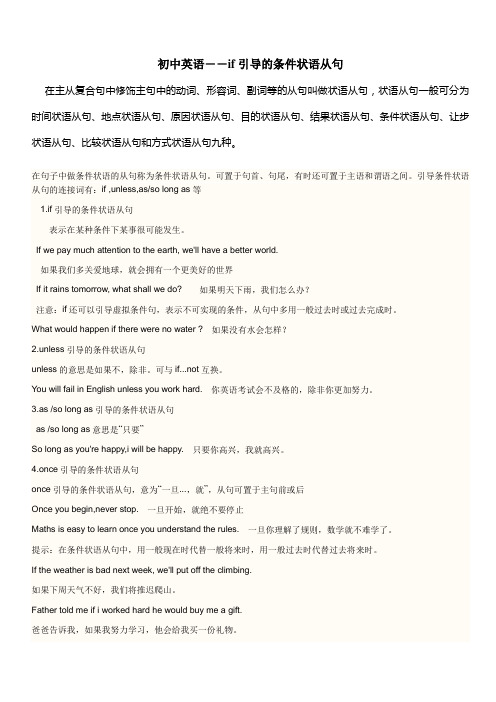
初中英语――if引导的条件状语从句在主从复合句中修饰主句中的动词、形容词、副词等的从句叫做状语从句,状语从句一般可分为时间状语从句、地点状语从句、原因状语从句、目的状语从句、结果状语从句、条件状语从句、让步状语从句、比较状语从句和方式状语从句九种。
在句子中做条件状语的从句称为条件状语从句。
可置于句首、句尾,有时还可置于主语和谓语之间。
引导条件状语从句的连接词有:if ,unless,as/so long as等1.if引导的条件状语从句表示在某种条件下某事很可能发生。
If we pay much attention to the earth, we'll have a better world.如果我们多关爱地球,就会拥有一个更美好的世界If it rains tomorrow, what shall we do? 如果明天下雨,我们怎么办?注意:if还可以引导虚拟条件句,表示不可实现的条件,从句中多用一般过去时或过去完成时。
What would happen if there were no water ? 如果没有水会怎样?2.unless引导的条件状语从句unless的意思是如果不,除非。
可与if...not互换。
You will fail in English unless you work hard. 你英语考试会不及格的,除非你更加努力。
3.as /so long as引导的条件状语从句as /so long as意思是“只要”So long as you're happy,i will be happy. 只要你高兴,我就高兴。
4.once引导的条件状语从句once引导的条件状语从句,意为“一旦...,就”,从句可置于主句前或后Once you begin,never stop. 一旦开始,就绝不要停止Maths is easy to learn once you understand the rules. 一旦你理解了规则,数学就不难学了。
If 引导的条件状语从句

If 引导的条件状语从句If引导的条件状语从句需要遵循主过从过、主将从现的原则。
例如,如果明天下雨,我就不会去爬山。
如果明天不下雨,我就会和朋友去乡村。
如果你帮我,我就能按时完成。
如果明天天气好,我们可能会出去。
如果你完成了作业,你就可以看电视。
如果你下周日去购物,请给我打电话。
如果我去那里,我会给她带些花。
如果明天下雨,我们会待在家里。
如果他在家,请给我打电话。
如果你更加努力,你就能通过考试。
如果她明天有时间,她会去看望她的爷爷。
如果火车没有准时到达,我们会坐出租车去市区。
如果老师迟到了,他会生气。
除此之外,如果否定形式的if可以转换成肯定形式的unless,例如你如果不努力,你就不能通过考试,可以转换成你除非努力,否则你就不能通过考试。
With your help。
I will be ___.If you wake up early。
you will arrive on time.Wake up early。
or you will be late.If you wake up early。
you won't be late for school.Wake up early。
and you will catch the early bus.1.I will tell you about your friend.Answer: A。
come2.If you go to college。
you will get a good ___. Answer: A。
will get3.I want to know if they will come tomorrow. Answer: B。
will come4.___ exercise。
and you'll be in good health. Answer: D。
and5.If it doesn't rain。
he will play ___.Answer: If it doesn't rain。
If引导的条件状语从句

→主句谓语中也可以用had better(not)do,提建议 例句:如果你想减肥,你最好锻炼。
eg:If you want to lose weight,you had better take some
2021/6/20
3
exercise.
if的反义词:if...not...=unless,意思是:“如果不,除非”
W--i-t-h--y--o-u--r--h--e-l-p-, I’ll finish my job soon. 如果你帮我,我将很快完成我的工作。 If there is no water, fish may die.
Fish may die w--i-th--o--u-t--w--a--t-e-r--. 如果没有水,鱼可能会死。
I won’t go there unless பைடு நூலகம் hear from you.(同义句 if ) don’t
I won’t go there _____ I _____hear from you. I won’t go to the party if I am not invited. (同义句)
I will go out tomorrow if it doesn’t rain. = If it doesn’t rain, I will go out tomorrow.
If 引导的宾语从句放在主句之后;而if引 导的状语从句可放在主句之前也可放在主 句之后
If 引导的条件状语从句放于句首时多用逗号隔开;
时态:
if引导的条件状语从句, 主句用一般将来时(will),从句用一般现在时。
→主句谓语中也可以含有情态动词, 如:must,can,could,should等
if 条件状语从句
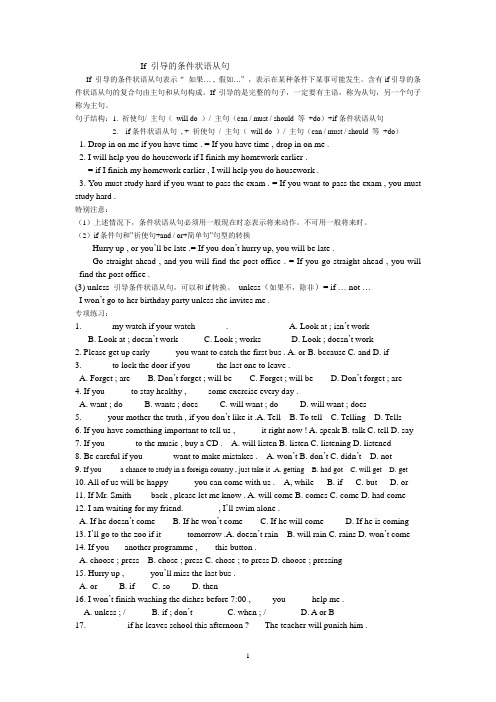
If 引导的条件状语从句If 引导的条件状语从句表示“如果… , 假如…”,表示在某种条件下某事可能发生。
含有if引导的条件状语从句的复合句由主句和从句构成。
If引导的是完整的句子,一定要有主语,称为从句,另一个句子称为主句。
句子结构:1. 祈使句/ 主句(will do )/ 主句(can / must / should 等+do)+if条件状语从句2. if条件状语从句, + 祈使句/ 主句(will do )/ 主句(can / must / should 等+do)1. Drop in on me if you have time . = If you have time , drop in on me .2. I will help you do housework if I finish my homework earlier .= if I finish my homework earlier , I will help you do housework .3. Y ou must study hard if you want to pass the exam . = If you want to pass the exam , you must study hard .特别注意:(1)上述情况下,条件状语从句必须用一般现在时态表示将来动作。
不可用一般将来时。
(2)if条件句和”祈使句+and / or+简单句”句型的转换Hurry up , or you’ll be late .= If you don’t hurry up, you will be late .Go straight ahead , and you will find the post office . = If you go straight ahead , you will find the post office .(3) unless 引导条件状语从句,可以和if转换。
If引导的条件状语从句
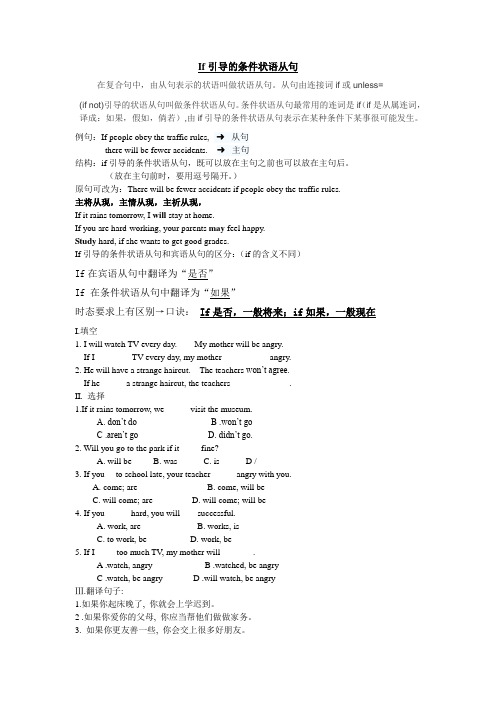
If引导的条件状语从句在复合句中,由从句表示的状语叫做状语从句。
从句由连接词if或unless=(if not)引导的状语从句叫做条件状语从句。
条件状语从句最常用的连词是if(if是从属连词,译成:如果,假如,倘若),由if引导的条件状语从句表示在某种条件下某事很可能发生。
例句:If people obey the traffic rules, ➜从句there will be fewer accidents. ➜主句结构:if引导的条件状语从句,既可以放在主句之前也可以放在主句后。
(放在主句前时,要用逗号隔开。
)原句可改为:There will be fewer accidents if people obey the traffic rules.主将从现,主情从现,主祈从现,If it rains tomorrow, I will stay at home.If you are hard-working, your parents may feel happy.Study hard, if she wants to get good grades.If引导的条件状语从句和宾语从句的区分:(if的含义不同)I.填空1. I will watch TV every day. My mother will be angry.If I ________TV every day, my mother _____ _____angry.2. He will have a strange haircut. The teachers won’t agree.If he _____ a strange haircut, the teachers______ _______.II. 选择1.If it rains tomorrow, we _____ visit the museum.A. don’t do B .won’t goC .aren’t go D. didn’t go.2. Will you go to the park if it ____ fine?A. will beB. wasC. is D /3. If you __to school late, your teacher _____ angry with you.A. come; areB. come, will beC. will come; areD. will come; will be4. If you _____ hard, you will ___ successful.A. work, areB. works, isC. to work, beD. work, be5. If I ____ too much TV, my mother will _______.A .watch, angryB .watched, be angryC .watch, be angryD .will watch, be angryⅢ.翻译句子:1.如果你起床晚了, 你就会上学迟到。
If引导的条件状语从句

--We’ll go to the library tomorrow if it __D_.
A. isn’t rain B. rain C. won’t rain D.will you do if you _____Ato the old folk’s
home visit?
2. I ____ her the answer if she ____me. A.can Dtell, will ask B. will tell, will ask C. would tell, ask D. will tell, asks
3. – What are you going to do tomorrow?
If 引导条件状语从句的时态为一般现在时
记住“主将从现”
7
----Sam, do you know if Alice ____to my party next week?
----I think she will come if she ____ free.
A comes; is B will come; will be C will come; is D comes; will be
If 引导的宾语从句放在主句之后;而if引 导的状语从句可放在主句之前也可放在主 句之后
5
1. Can you tell me if she can come to the meeting ?
2. She will not go there if it is rainy tomorrow.
3. I can’t guess if she will be angry . 4. If we help each other , we both will get
if 引导条件状语从句

if 引导条件状语从句【最新版】目录1.条件状语从句的定义和作用2.if 引导条件状语从句的用法3.实例分析4.注意事项正文一、条件状语从句的定义和作用条件状语从句是表示某种条件成立时,主句所表达的内容才会实现的从句。
它通常由连词 if 引导,用来表示在某种条件下,主句所述情况是否成立。
条件状语从句在英语中十分常见,具有很强的实用性。
二、if 引导条件状语从句的用法if 引导条件状语从句时,主句通常使用一般将来时,而从句则使用一般现在时。
这种时态搭配是为了表示在某种条件下,将来会发生的事情。
当然,在某些特殊情况下,也可以使用其他时态,例如主句使用一般现在时,从句使用一般将来时。
三、实例分析1.如果明天不下雨,我们会去公园。
(If it doesn"t rain tomorrow, we will go to the park.)在这个例子中,从句“it doesn"t rain tomorrow”表示一种条件,即明天不下雨,主句“we will go to the park”表示在这种条件下会发生的事情,即我们去公园。
2.如果你愿意,我们可以一起去看电影。
(If you are willing, we cango to the movies together.)在这个例子中,从句“you are willing”表示一种条件,即你愿意,主句“we can go to the movies together”表示在这种条件下会发生的事情,即我们一起去看电影。
四、注意事项在使用 if 引导条件状语从句时,需要注意以下几点:1.条件状语从句中的 if 通常可以翻译为“如果”,但有时也可以翻译为“是否”或“是不是”,具体翻译需要根据上下文判断。
2.条件状语从句中的时态搭配要正确,通常为主句一般将来时,从句一般现在时。
3.条件状语从句有时可以省略 if,直接用主句和从句连接,例如:It will be fine if it doesn"t rain.(如果下雨,天气就不会好了。
If-引导的条件状语从句
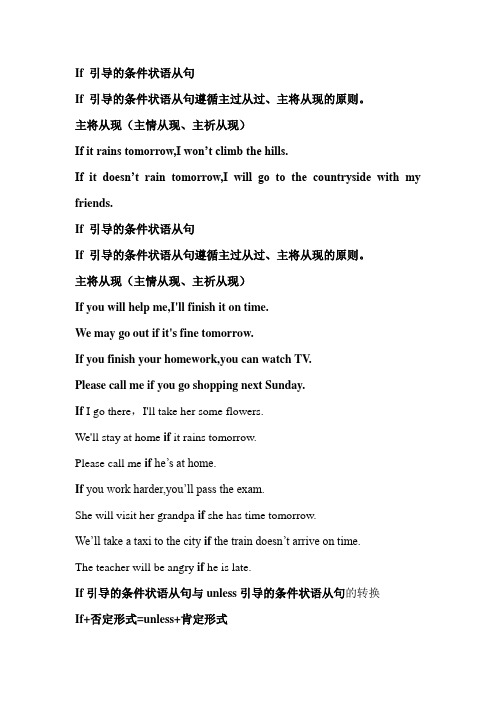
If 引导的条件状语从句If 引导的条件状语从句遵循主过从过、主将从现的原则。
主将从现(主情从现、主祈从现)If it rains tomorrow,I won’t climb the hills.If it doesn’t rain tomorrow,I will go to the countryside with my friends.If 引导的条件状语从句If 引导的条件状语从句遵循主过从过、主将从现的原则。
主将从现(主情从现、主祈从现)If you will help me,I'll finish it on time.We may go out if it's fine tomorrow.If you finish your homework,you can watch TV.Please call me if you go shopping next Sunday.If I go there,I'll take her some flowers.We'll stay at home if it rains tomorrow.Please call me if he’s at home.If you work harder,you’ll pass the exam.She will visit her grandpa if she has time tomorrow.We’ll take a taxi to the city if the train doesn’t arrive on time.The teacher will be angry if he is late.If引导的条件状语从句与unless引导的条件状语从句的转换If+否定形式=unless+肯定形式You won’t pass the exam if you don’t work hard.=You won’t pass the exam unless you work hard.If you don’t go to bed earlier,you will feel tired in the morning. =Unless you go to bed earlier,you will feel tired in the morning. If it doesn’t rain,he will play with me tomorrow.=Unless it rains,he will play with me tomorrow.If she doesn’t come,I’ll go shopping alone=Unless she comes,I’ll go shopping alone.if条件状语从句与祈使句,and/or+一般将来时的句子转化If you get up early,you’ll get there on time.=Get up early,and you’ll get there on time.=Get up early,or you won’t get there on time.If you get up early,you won't be late for school.=Get up early,and you won't be late for school.=Get up early,or you will be late for school.If you don’t get up early,you won’t catch up with the early bus. =Get up early,and you will catch up with the early bus.=Get up early,or you won’t catch up with the early bus.if条件状语从句与without的句子转化If there is no water,we can't live.=We can't live without water.If there is no water,fish will die.=Fish will die without water.If you help me,I’l l finish the work soon.=With your help,I finish the work soon.if条件状语从句与祈使句,and/or+一般将来时的句子转化If you get up early,you’ll get there on time.=Get up early,and you’ll get there on time.=Get up early,or you won’t get there on time.If you get up early,you won't be late for school.=Get up early,and you won't be late for school.=Get up early,or you will be late for school.If you don’t get up early,you won’t catch up with the early bus.=Get up early,and you will catch up with the early bus.=Get up early,or you won’t catch up with the early bus.1. your friend ,I'll tell you.eB.will comeesD.are coming2. If you go to college,you a good education.A.will getB.getC.getsD.got3.I want to know if they tomorrow.eB.will come C comes D.came4.Take enough exercise, you'll be in good heath.A.orB.soC.butD.and5.If it (not rain),he (play)basketball withme tomorrow.6.If Uncle Lan ______(come),I______(call)you up.7.She must see a dentist if she______(have)a toothache.8.Please wake me up if he______(come)back.9.Hurry up!Or you ______(be)late again.10.If you don’t be quick,you(be)late.1.We won’t wait for you you can’t arrive on time.A.untilB.whenC.afterD.if2.The children will go to the zoo if it (not rain)this Saturday.3.If she work hard,she be able to go to colleage.A.not,notB.won’t,won’tC.won’t,doesn’tD.dpesn’t,won’t4.If I run every day,I (be)healthier.5.If it (not rain),he (play)with me tomorrow.6.She must see a dentist if she (have)a toothache.7.Study hard,or you (not pass)the test.8.If you (not go)to bed earlier,you will feel tired in the morning.9.If he (be)free tomorrow,he will come to your birthday party.10.We will go to the zoo if it (not snow)tomorrow.。
If引导的条件状语从句
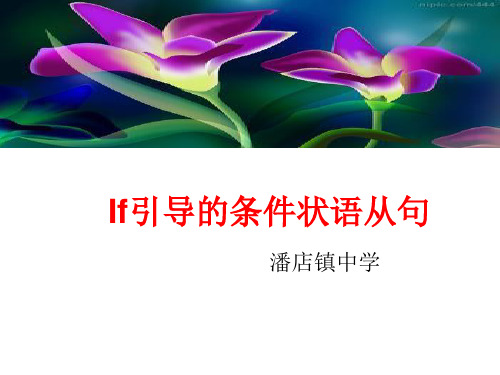
5. If you __d_o_n_’_t _w_o_rk___(not work ) hard , you _w_o_n_’_t _p_as_s_(not pass) the exam.
6. If she __m__e_n_d_s_(mend) the computer , her father __w_o_n_’t_b_l_am__e_(not blame ).
1.有if引导的条件状语从句的复合句中,当主句和从句的 主语均为you时,可转换为“祈使句,and+简单句”或
“祈使句,or+简单句” You can pass the exam if you work hard. Work hard ----------------,and you will pass the exam.
If you don't hurry up,you will be late again.
or Hurry up,------ you will be late again.
2. 借助介词with 或without来转换。
例如: If you help me, I’ll finish my job soon.
If引导的条件状语从句
潘店镇中学
if引导的条件状语从句
例句:If people obey the traffic rules, →从句 there will be fewer accidents. →主句
if:从属连词,意思是:“如果,假如,倘若”
: 结构
if引导的条件状语从句既可以放在句子前, 也可以放在句子后。
时态:
if引导的条件状语从句, 主句用一般将来时(will),从句用一般现在时。
→主句谓语中也可以含有情态动词, 如:must,can,could,should等
小学英语if 引导的条件状语从句讲解

if引导的条件状语从句(包含主将从现原则)一.if的位置:if“如果”,当引导条件状语从句时,既可以放在主句前面,也可以放在主句后面。
若if引导的条件句放在句首,从句后面要加逗号与主句隔开。
例如:My mother will take me to the park if she is free.如果我妈妈有空,她就会带我去公园。
If my mother is free, she will take me to the park.如果我妈妈有空,她将会带我去公园。
(此句if引导的条件状语从句位于句首,主句位于其后,所以要用逗号隔开)二.时态的运用注意:在if的条件状语从句中,主句为下列情形之一时,if条件状语要用一般现在时。
1.主句是一般将来时(主将从现)例如:If he comes, he will tell me all.如果他来了,他会告诉我所有(的事情)。
(这个知识点在初中阶段是常考题,简称“主将从现”——主句是一般将来时态,从句是一般现在时态。
本句中主句是由will引导的一般将来时态的句子,从句是由if引导的一般现在时态的句子,符合主将从现的法则。
)2.主句是含有情态动词may/might/can/must/should等句子。
例如:If you want to lose weight, you must eat less bread.如果你想减肥,你必须少吃面包。
(主句中含有情态动词must,所以if引导的条件状语从句要用一般现在时态。
)3.主句是祈使句例如:If you are not strong enough, please don't take part in such an activity.如果你不够强壮,请不要参加这种活动。
(主句是一个Do型的祈使句,所以根据原则,if从句要用一般现在时态。
——不清楚Do型祈使句的小伙伴可以查看冉老师历史发文记录)三.习题1.If you to be a rich man ,you should try hard.A. wantingB. wantedC. wantD.are want2. If you English, you can be an English teacher.A. likingB. likedC. likeD. are like3. If you like sports , you a PE teacher.A. areB. mustC. can beD. could。
总结好的:if引导的条件状语从句

总结好的:if引导的条件状语从句if引导的条件状语从句if1) ⽤法:(1)条件状语从句通常由连词if引导,意为“如果、假如”,主句不能⽤be going to表⽰将来,⽽应该⽤shall,will。
If you leave now, you are never going to regret it. (错误)If you leave now, you will never regret it. (正确)(2)if “如果”,引导条件状语从句,主句⽤⼀般将来时,从句则⽤⼀般现在时,如:If it rains tomorrow, I shan’t climb the hills.(3)另外,主句是祈使句或含有情态动词,从句也⽤⼀般现在时。
如:Please call me if he comes next Sunday.Can you call the policeman if you are in the trouble.注意宾语从句中的if与条件状语从句if的区别。
宾语从句中的if“是否”相当于whether,引导宾语从句,时态需根据语境确定。
如果主句⽤⼀般现在时,从句可以根据具体情况选⽤时态,如果主句⽤⼀般过去时,从句必须⽤过去式的某种形式。
I don't know if it will rain tomorrow. 我不知道明天是否会下⾬。
Our teacher said there was going to be a football match the next month.我们说下⽉将有场⾜球⽐赛。
【边学边做】⽤括号内所给词的正确形式填空。
1. What will you buy if you ________(have)a lot of money?2. If it ________(not snow)tomorrow, we will feel unhappy.3. You mustn’t go to school if you ________(be)still in bed.4. If he _______(be)at home at that time, he would know it.5. Please show me the way if you ________(know)it.6. You will hurt your teeth if you ________(eat)too much candy.7. If you gave me a toy car, I _________(be)very happy.8. I would get the prize if I _________(work)hard.9.If she ______ (finish ) work early ,she ______(go) home.10.If the weather______(be)fine,we_______(go)for a walk .11. If I_____(have) time tonight ,I _______(finish) the book I’m reading.12. If it ______(rain) next weekend , we_______(not be able to ) plant the vegetable .13. If it_______(rain),we______(stay) at home .14.If she______(arrive) ,she _____(phone) me .15. If he_____(call),tell him I’ll ring back .⼆、⽤所给词的适当形式填空1. If you ________(feel) tired, you _________ (have) to have a rest.2. Where _____ he ____(see) the film if he _________(have) time?3. If there ____ (be) fewer trees, there _______ (be) more pollution.4. He ___ (dress) more casually if he ___ (not work) on weekends.5. If Marcia _______ (live) alone, she _______ (keep) a pet parrot.6. Lana _____ (buy) a new dress if the old one ____ (be) out of style.7. The twins _______ (fight) if they__________ (argue).8. I ______ (have) a bake sale if I ____ (need) money for education.9. Peter ____ (send) me a beautiful souvenir if he ____(tour) Spain.10. If Mr. Green _______ (say) I am hard- working, my parents ___ (feel) glad.11. I ______ (go) to the beach if it________ (not rain) this week.12. _____they ___ (have) a match if the P.E. teacher __ (be) busy?13. He ____ (write) a letter to his grandparents if he ____ (get) his report card this week.14. If she ______ (get) up late, she _____ (not catch) the early bus.15. Peter ____ (major) in English if he ____(pass) the exams in Peking University.⼆、完成句⼦1. 他如果看电视太久了,他的⽗母会不⾼兴。
if条件状语从句

if引导的条件状语从句三步曲中学英语园地·初二版年4期结构曲:if是从属连词,意为“如果”,用来引导条件状语从句。
if引导的条件状语从句既可放在主句之前,也可放在主句之后。
从句位于主句之前时,常用逗号将其与主句隔开。
例如:If she invites me,I will take part in her birthday party. (= I will take part in her birthday party if she invites me.)时态曲:在下面任何一种情况下,都可在if引导的条件从句中用一般现在时表示将来时间。
1)主句的谓语动词是一般将来时; 2)主句的谓语动词中含有can/may等情态动词; 3)主句的谓语动词中含有want,wish,hope等动词; 4)主句是祈使句。
例如:You will be late for school if you get up late.If you help me,I can finish my homework on time.If I finish my homework,I wish I can watch TV.Don’t forget to lock the door if you are the last one to lea ve the room.转换曲:可用下述方法将if条件状语从句转换为其他形式:1)借助“祈使句 + and/or + 陈述句”来转换。
其中and表示句意顺承,or表示转折。
例如:If you use your head,you’ll find a way. (= Use your head,and you’ll find a way.)If you don’t hurry up,you’ll be late. (= Hurry up,or you’ll be late.)2)借助介词with 或without来转换。
if引导的条件状语从句的用法

(3)假设
真的,或者有可能成为真的;
(二)假设将来,假设的条
将来
件是将来可能实现的。
1. if 非真实条件句(虚拟)——假设现在
(二)遵循的原则
should do
might+do
例 7 If I _____(be) a bird,I would fly to you right
状态,是正在玩球的意思,
所以此空填 is playing。
3. if 引导的真实条件状语从句——假设将来
例 3 If it _____(rain) tomorrow,we will stay at home.
解析:如果你不想受伤,
就不要玩刀。根据 Don’
t
play with the knife,主句是祈使句,所以从句为 if 引导
to the park.
he will take me to the park,主句用的一般将来时,而且
可以分析出,他哥哥现在还没有回,所以从句为 if 引
导的表将来的条件状语从句。根据“主将从现”的原
则,此空填 comes。
2. if 非真实条件句(虚拟)——假设过去
例8
Years ago if someone_____ (turn) round to
批改学生作文时,遇到拼写错误较多的学生可以这样
及各个时代相关代表作品的赏析,感受中西方文化的
评价:
不同,提高其审美水平;在进行人教版(2014)高中英
neat and tidy!
学生参观学校的科学实验室或者本地的科技馆,感受
1. 认 同 欣 赏:I like your handwriting,which is so
if 引导的条件状语从句

一、if 引导的条件状语从句,主句用一般将来时,从句一般现在时。
即“主将从现”连词if的意思是“如果”,它引导的句子表示某事发生所需要的条件,即“在……条件下某事才能发生”,在句子中充当状语,因此我们称之为条件状语从句。
在复合句中连词if引导的句子为从句,被修饰的句子为主句。
从句可以放在主句后,也可以放在主句前,从句放在主句前时,应用逗号将它与主句隔开if_______If you study hard, you will get good grades.I _won’t_ play basketball this afternoon if it_ __rains___.I ___will_ play basketball this afternoon if it __doesn’t_ _rain.练一练1. If you _____ to the party, you’ll have a great time.A. will goB. wentC. goD. going2. – What are you going to do tomorrow? --We’ll go to the library tomorrow if it ___.A. isn’t rainB. rainC. won’t rainD. doesn’t rain3. I’ll give the book to him if he ___ here next Sunday.A. will comeB. comesC. is comingD. came4. There _________a basketball match in our school tomorrow afternoon, if it doesn’t rain.A. will be B will have C have D is用go与rain的正确形式We_______ to the Great Wall if it ____________ tomorrow.If it ______________ tomorrow, we___________to the Great Wall.二、as soon as的用法“一···就···”的意思主句用一般将来时,从句一般现在时。
if引导的条件状语从句

If引导的条件状语从句
II.用法。 • (1).条件状语从句通常由连词if引导,if意为“如果;假 如“,主句不能用be going to 表示将来,而应该用shall 或will. Eg: If you leave now, you will be regretful. 如果你现在离开,你会后悔的。 (2).if 意为“如果”,引导条件状语从句时,若主句用一般 将来时,从句则用一般现在时;若主句用一般过去时,从 句也要用表示过去的相应时态。 Eg: If it rains tomorrow, I won’t climb the hills. 如果明天下雨,我就不去爬山。 If I didn’t apologize, I would feel guilty. 如果我不道歉,我会感到内疚。
注意:宾语从句的if与条件状语从句if 的用法有所区别。 宾语从句的if 表示“是否”,相当于whether , if 引导宾 语从句时,从句时态需要根据具体的语境来确定。 Eg: I don’t know if it 道明天是否会下雨。
III. Do exercise. • III. 用if 引导的条件状语从句改写句子。 • 1. It will snow tomorrow. We will build a snowman. If it snow tomorrow, we will build a snowman. ____________________________________________. • 2. You have a computer. You can use it to do a lot of things. If you have a computer, you can use it to do a lot of things. 3. I have time. I’ll drop in on you. If I have time, I’ll drop in on you.
- 1、下载文档前请自行甄别文档内容的完整性,平台不提供额外的编辑、内容补充、找答案等附加服务。
- 2、"仅部分预览"的文档,不可在线预览部分如存在完整性等问题,可反馈申请退款(可完整预览的文档不适用该条件!)。
- 3、如文档侵犯您的权益,请联系客服反馈,我们会尽快为您处理(人工客服工作时间:9:00-18:30)。
If引导的条件状语从句中考题型1. I will send you an e-mail as soon as I _______ in Canada.A. arriveB. arrivedC. am arrivingD. will arrive2. If there _______ no buying and selling of animals, there ______ no killing in nature.A. is; will heB. will be; will beC. is; isD. will be; is3. I’m waiting for my friend._____, I'll go shopping alone.A. If she comesB. If she won't comeC. If she doesn't come4. Mr. Green speaks very loudly _______ all the people can hear him cl early.A. whenB. so thatC. because5. You can’t watch TV ________ you finish your homework.A. beforeB. ifC. whileD. as6. As we all know, planting trees is good for the environment.Our class will go to the Sun Island tomorrow. As soon as we ______ th ere, we’ll begin to plant trees.A. arrivedB. arriveC. will arrive7.The students ________ have a sports meeting this weekend if it ____ ____.A. won’t; rainsB. will; rainsC. won’t; will rainD. are going to; is going to rain8.Don’ talk loudly at the meeting. If you ________, you will have to leave.A. doB. areC. did9. I don't know if she _______ to my birthday party tomorrow. If she _ _____, I'll be very happy.A. comes; comesB. will come; comesC. comes; will come10. — When will you come to Daqing? — I will call you _____I arrive.A. tillB. whileC. as quickly asD. as soon as11 I’ll give it to Jim as soon as I _______ him tomorrow.A. sawB. will seeC. seeD. have seen12. I’m waiting for my friend. _______, I’ll go shopping alone.A. If she comesB. If she doesn’t comeC. If she won’t come13. If she ______ here tomorrow, I will tell you.A. comesB. will comeC. comeD. came14.Mary, could you tell me if your mother ________ our school sports meeting tomorrow?—I think she will come to school if she _________ free.A. will take part in; will beB. takes part in; isC. will take pa rt in; isD. takes part in; will be15. —Tom wants to know if you will have a picnic tomorrow. —Yes. But if it ______, we’ll play chess instead.A. will rainB. rainedC. is rainingD. rains16.— You study ______ hard _______ you’re sure to pass the exam.— Thank you for saying so.A. enough, toB. as, asC. so, that17. If Tom _____ the game, we'll give him a surprise".A. winB. winsC. wonD. miming18. — I hear the famous singer Xu Song may come to Ningbo next mo nth.— Really? _______ he comes, my younger sister will be very excited.A. IfB. UntilC. UnlessD. Before19. -What time will Diana get to Chengdu?-I’m not sure. When he ________, I’ll call you.A. will arriveB. arriveC. arrives20. Zhou Libo is Shanghai’s favorite funny man. He is good at making people laugh. His lively shows were _________ hot that tickets sold out in minutes.A. veryB. tooC. suchD. so21. They develop their skills _________ they can do things better and better.A. howeverB. becauseC. sinceD. so that22. They develop their skills _________ they can do things better and better.A. howeverB. becauseC. sinceD. so that23. —Let’s go fishing if it _____ this weekend. —But nobody knows if it _______.A. is fine, will rainB. will be fine, rainsC. will be fine, will rainD. is fine; rains1. 答案:A 【解析】考查点:本题考查状语从句的时态的用法。
当主句是将来时态时,状语从句用一般时态来代替将来时,所以选择答案A。
2. 答案:A 【解析】考查点:本题考查if引导的状语从句的时态。
if 意为“如果”。
引导条件状语从句,主将从现。
故选A。
3答案:C 【解析】考查从句的时态。
If引导的条件状语从句,主句用将来时,从句用一般现在时。
根据句意:如果他不来,我就独自去购物。
故选C。
4. 答案:B 【解析】词义辨析。
When 是“当------的时候”的意思;so that是“为了,目的是”的意思;because是“因为”的意思;本句中,so that 引导的目的状语从句。
5. 答案:A 【解析】本题考查词义辨析。
A项意为“在……之前”;B项意为“假如;即使”;C项意为“当……时候”;D项意为“因为”。
句意为“你不能看电视在你完成作业_____”。
根据语可知此空应为before.故选A。
6.答案:B 【解析】考查状语从句的时态。
在as soon as引导的时间状语从句中,如果主句和从句的动作都发生在将来,从句用一般现在时表示将来,句意:我们一到那儿,我们就开始植树。
故选B.7.答案:A 【解析】考查if引导的条件状语从句用法。
if意为“如果”,引导条件状语从句,主句用一般将来时,从句用一般现在时态。
句意为“如果明天下雨我们就不举行运动会了”。
故选A。
8. 答案:A 【解析】考查状语从句的时态当主句为将来时态是,if引导的状语从句中用一般时态代替将来时,而这里需要助动词,不是系动词,所以选择答案A。
9. 答案:B 【解析】宾语从句和条件状语从句的考查。
由if引导的条件状语从句,用一般现在时态,主句用一般将来时。
当if做是否讲时,所引导的宾语从句通常是一般将来时。
10答案:D11【解析】C 考查点:考察条件从句的时态。
解题思路:as soon as表示“一……就……”,其主句用将来时态,从句要用一般现在时态。
故选C。
12答案:B13答案:A14答案:C 【解析】考查if引导的宾语从句及条件状语从句的用法。
问句是由if引导的宾语从句,时间状语为tomorrow,故用一般将来时;答语是由if引导的条件状语从句,主句用将来时,从句用一般现在时,故选C。
15答案:D16答案:C 【解析】考查so…that的用法。
enough...to“足够做……”;as...as...“和……一样”;so...that...“如此……以至……”。
由句意:-你学习如此的努力以至于你肯定能通过考试。
-谢谢你这么说。
故选C。
答案:B17【解析】考查if引导的条件状语从句。
在if引导的条件状语从句中,如果主句和从句发生的动作都在将来时间,从句用一般现在时表将来。
故选B。
18答案:A 【解析】状语从句考查。
if如果;until到……为止;unless除非;before在……之前。
根据句意,如果他来,我的妹妹将会很激动的。
19答案:C 【解析】考查从句的时态。
When引导的时间状语从句中,如果主句和从句的动作都发生在将来,主句用将来时,从句用一般现在时。
he是单数第三人称形式,故用arrives。
20答案:D 【解析】句型考查。
句中的句型为so…that…, 意为“如此….以至于…”,so 用来修饰形容词或副词,such也构成这一句型,但such 用来修饰名词。
